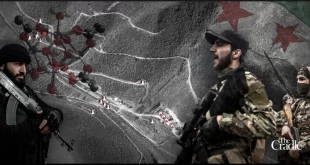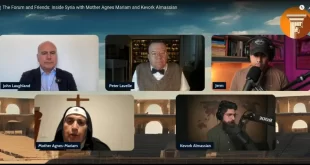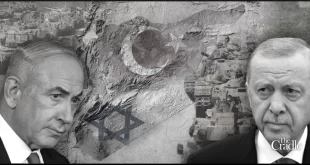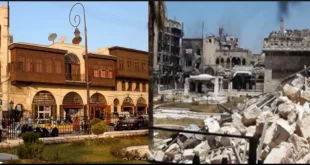The following article is republished from Mideast Discourse:
Steven Sahiounie, journalist and political commentator
The January 20 attack on the Ghweran prison in Hasaka, Syria carried out by ISIS terrorists is being blamed on the international community, and western democracies specifically, by Kurdish officials who are responsible for the security at the prison.
Abdulkarim Omar, the co-chair of the Kurdish administration’s foreign office, said the attack was the result of the international community’s failure to shoulder its responsibilities of the ISIS prisoners who are imprisoned in Syria. Kurdish authorities have warned for years that they are not able to properly feed and guard the massive camps of ISIS terrorists and their wives and children. Their repeated requests have never been addressed as the prisoners remain in squalor, without charges, legal procedures, or trial date.
Omar reported to the Kurdish media on Friday that they have “consistently appealed to the international community for ISIS militants in jails and camps. We warned that the current situation could not be maintained. The world and international community must carry out their responsibilities in dealing with the ISIS problem.”
“Every country should take its citizens back. Those who do not accept them should come and assist us, and ISIS members should be prosecuted,” he added.
General Mazloum Abdi is the leader of the Syrian Democratic Forces (SDF) who is the American-backed ally in Syria and the fight against ISIS. Despite repeated warnings to the Americans, the prison break succeeded with the most dangerous terrorists on earth being set free.
On Monday, the SDF confirmed that they have still not taken back control of the prison after a suicide car bomb was detonated at the gates, which then allowed the prisoners to confiscate weapons and turn them on the SDF guards. 17 of the SDF were killed, and 23 were wounded. The prison holds about 5,000 inmates, but it is still not known the exact number who were able to escape or those who had been killed or recaptured. The prison is in the northeast of Syria in a semi-autonomous region the Kurds call “Rojava”.
ISIS used young and teenage males as ‘child soldiers in the prison break. The prison is segregated into male adults, teenage boys, and women with small children. The terrorists used the opportunity of indoctrinating the teenage boys’ unit to use them not only as child soldiers but also as human shields.
In May, a United Nations human rights report said the conditions under which children were held in northeast Syria can describe torture and inhuman and degrading treatment under international law. The report described overcrowded conditions, no access to sunlight, malnourishment, and untreated injuries.
Letta Tayler, associate director at Human Rights Watch, said the crisis happening now could have been averted if the children’s home countries had agreed to repatriate them. Almost 700 child detainees are being held in Ghweran prison still under siege after the attack.
“Detention should be an exceptional measure of last resort,” she said on Twitter. “Instead, foreign countries dumped responsibility for these children on the NE Syrian authorities. If anything happens to these boys during this prison assault, the boys’ home countries will have children’s blood on their hands.”
The US position and statements
On Saturday, Ned Price of the US State Department condemned the attack on Ghweran prison.
His statement read, “This attack highlights the importance of, and the need to fully fund, the Global Coalition to Defeat ISIS’s initiatives to improve the secure and humane detention of ISIS fighters, including by strengthening detention facility security. It also underscores the urgent need for countries of origin to repatriate, rehabilitate, reintegrate, and prosecute, where appropriate, their nationals detained in northeast Syria.”
“The coalition has taken great measures to ensure the humane treatment of detainees, but when ISIS detainees took up arms, they became an active threat and were subsequently engaged and killed by the S.D.F. and coalition airstrikes,” said Maj. Gen. John W. Brennan Jr., commander of the anti-Isis coalition in Iraq and Syria.
Pentagon spokesman John Kirby said Apache helicopter gunships launched airstrikes and conducted low-altitude flights in a show of force.
On June 24, Acting US Special Envoy for the Global Coalition to Defeat ISIS and Acting Counterterrorism Coordinator John T. Godfrey visited Al-Hol camp, and Ghweran prison with a delegation of officials and they assessed security arraignments.
Godfrey reported, “Together with Coalition partners, the United States supports ongoing efforts to improve conditions and security in displacement camps and detention facilities, and to promote improved infrastructure, sanitation, health, education, and economic development in areas liberated from ISIS control.”
The Ghweran prison and others
There are over 10,000 ISIS prisoners in northeast Syria, and ISIS wives and their children make up the majority of the population of the notorious al-Hol camp which consists of about 56,000 people, with more than 10,000 of them being foreigners, many from various western democratic countries who have been held since the fall of Baghuz in 2019.
Ghweran and al-Shaddadi prisons in Hasaka hold an estimated number of 7,500 Syrian and foreign ISIS suspects, including children, Human Rights Watch (HRW) said in 2020. HRW says the SDF holds about 12,000 men and boys suspected of ISIS affiliation, including 2,000 to 4,000 foreigners from almost 50 countries.
Thousands of others are held in secret detention centers where torture is rife, activist groups say.
The Arabs who live near the prison
Arab inmates have been held without charges or trial, fueling resentment by Arab tribal members who accuse the SDF of racial discrimination, and ethnic cleansing of the northeast of Syria.
It is the Syrian Arabs who are the majority of the region, but the US-backed Kurdish forces and their administrative arm are in control of the area at the expense of Syrian families who have been forced from their homes and lands at the hands of the SDF.
Arab tribal elders say some of their community have sympathy for the ISIS inmates, seeing them as victims of the Kurdish occupation of the northeast, which has spawned resentment.
In the wake of the prison break, thousands of residents of Hasaka fled their homes in the bitter cold as the SDF closed in.
Who benefits from the break?
The ISIS inmates benefit as they gain their freedom, and the SDF and the Rojava administration benefit by lessening the load they were tasked and ill-equipped for, and the US benefits by having a new reason to stay longer in Syria.
What does the international community have to say about Syria?
On June 28, the Governments of the United States, Italy, Canada, Egypt, France, Germany, Greece, Iraq, Ireland, Japan, Jordan, Lebanon, the Netherlands, Norway, Qatar, Saudi Arabia, Turkey, the United Arab Emirates, the United Kingdom, and representatives of the League of Arab States and European Union met on the margins of the Defeat ISIS Coalition Ministerial to discuss the crisis in Syria.
They resolved to focus on humanitarian needs, UN cross-border mechanism, and continued support to Syrian refugees and host countries.
Humanitarian needs are only focused on the Al Qaeda-occupied Idlib province, and a few other border areas which are Turkish-occupied areas or the US-occupied areas. The vast majority of the Syrian territory and inhabitants are under the Syrian central government in Damascus and do not receive any assistance from foreign donors. These “Friends of Syria” who meet to discuss humanitarian needs do not recognize the needs of the majority of the civilian population but are focused on only the needs of people under the occupation of US and UN-recognized terrorists.
While millions of Syrians left Syria, and some are in refugee camps in Turkey, Lebanon, and Jordan, more Syrians remained at home and need help inside Syria. It would seem only those who left Syria are being rewarded with international help.
The international community says they support the efforts of UN Special Envoy Geir Pedersen and the UN Security Council Resolution 2254 as the solution to almost 11 years of attack on Syria. However, part of the resolution states “as well as fighting against terrorism in all its forms and manifestations.”
However, the US and EU consistently complain if the Russian forces or the Syrian Arab Army attack Al Qaeda positions in Idlib province. It would appear that UN 2254 is a tool to prolong the suffering of the Syrian people and prevent the rebuilding of their homes and lives. Besides 2254, the other favorite tool in the toolbox for the US and EU is the sanctions on Syria which prevent importing anything which will be used to rebuild Syria and has even prevented the importation of medical supplies and devices which should be exempt on humanitarian grounds, but western companies are too afraid of the US-EU sanctions to attempt to send anything to Syria.
Steven Sahiounie is a two-time award-winning journalist
 Syria Support Movement solidarity with the Syrian people
Syria Support Movement solidarity with the Syrian people




